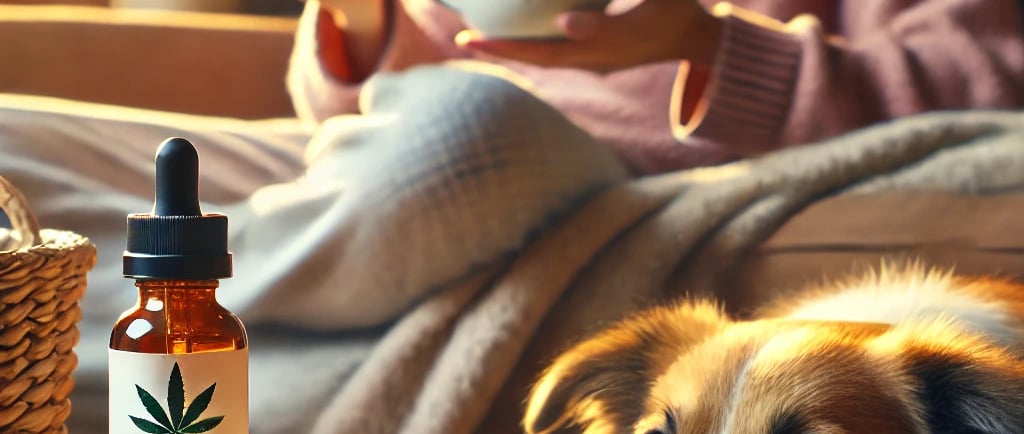Cannabis for Anxiety: How It Works in Humans and Animals
Anxiety is one of the most common mental health challenges, affecting millions of people and animals worldwide. As interest in natural alternatives to pharmaceuticals grows, cannabis—specifically CBD (cannabidiol)—has emerged as a promising option for anxiety relief. But how does cannabis help with anxiety? Does it work the same way for humans and pets? And what are the risks? In this article, we’ll explore how cannabis interacts with the brain, the differences between CBD and THC, and whether it can be a safe and effective solution for both people and animals suffering from anxiety.
CANNABIS GUIDE
2/25/20253 min read


Understanding Anxiety and the Endocannabinoid System
Anxiety disorders are characterized by excessive worry, nervousness, and fear. In both humans and animals, anxiety can be triggered by stress, trauma, or genetic predisposition.
The body has a natural regulatory network called the endocannabinoid system (ECS), which helps maintain balance (homeostasis) in various functions, including:
Mood and stress response
Sleep regulation
Pain perception
Cannabinoids from the cannabis plant, like CBD and THC, interact with this system, influencing how the body manages anxiety and stress.
CBD vs. THC: Which One Helps with Anxiety?
Cannabis contains over 100 cannabinoids, but the two most studied are:
CBD (Cannabidiol): A non-psychoactive compound known for its calming, anti-anxiety, and anti-inflammatory properties.
THC (Tetrahydrocannabinol): The psychoactive compound responsible for the “high” sensation. In some cases, THC can actually increase anxiety instead of reducing it.
For anxiety relief, CBD is preferred, as it:
✔️ Reduces stress and promotes relaxation
✔️ Does not cause a high or impairment
✔️ Has minimal side effects compared to THC
THC, on the other hand, can be a double-edged sword—it may help some people with relaxation, but higher doses can trigger paranoia and worsen anxiety.
How Cannabis Helps with Anxiety in Humans
1. Regulating Stress Response
CBD interacts with serotonin receptors (5-HT1A), the same receptors targeted by traditional anti-anxiety medications like SSRIs (e.g., Prozac, Zoloft). By modulating serotonin levels, CBD can help regulate mood and emotional stability.
2. Reducing Overactivity in the Amygdala
The amygdala is the part of the brain responsible for fear and stress responses. Studies suggest that CBD reduces hyperactivity in the amygdala, leading to a more calm and balanced emotional state.
3. Enhancing Sleep Quality
Anxiety often causes insomnia or restless sleep. CBD has been shown to:
✔️ Promote relaxation and deeper sleep
✔️ Reduce nighttime awakenings
✔️ Regulate sleep cycles
4. Preventing Panic Attacks & Social Anxiety
CBD has been studied for its effects on social anxiety disorder (SAD) and panic disorder. Research suggests that taking CBD before stressful situations (like public speaking) can significantly reduce anxiety and improve performance.
How Cannabis Helps with Anxiety in Animals
Like humans, animals have an endocannabinoid system (ECS) that regulates mood and stress. Some pets—especially dogs and cats—experience separation anxiety, fear of loud noises, or general nervousness.
1. Reducing Separation Anxiety
Pets with separation anxiety exhibit behaviors like:
Excessive barking or whining
Destructive chewing
Pacing and restlessness
CBD can help calm the nervous system, allowing pets to feel more secure when left alone.
2. Easing Fear of Loud Noises
Thunderstorms, fireworks, and loud noises can trigger severe anxiety in pets. CBD may help by reducing hyper-reactivity in their nervous system, keeping them calmer during stressful events.
3. Helping Rescue Animals Recover from Trauma
Animals that have experienced abuse or neglect often suffer from chronic anxiety and PTSD-like symptoms. CBD may help by:
✔️ Reducing hypervigilance
✔️ Lowering cortisol (stress hormone) levels
✔️ Encouraging trust and relaxation
How to Use Cannabis for Anxiety in Humans & Pets
For Humans:
Best Methods of Consumption:
CBD Oil/Tinctures – Fast-acting and easy to dose
CBD Capsules – Long-lasting effects
CBD Gummies – Convenient for daily use
CBD Vape Pens – Quick relief for acute anxiety
Recommended Dosage:
Mild Anxiety: 10–25 mg of CBD per day
Moderate Anxiety: 25–50 mg per day
Severe Anxiety: 50–100 mg per day (consult a doctor first)
For Pets:
Best CBD Products for Animals:
CBD Oil for Pets – Can be added to food or given directly
CBD Treats – Pre-measured doses in tasty snacks
CBD-Infused Pet Chews – For joint health & relaxation
Recommended Dosage:
Dogs: 0.1–0.2 mg per pound of body weight
Cats: 0.1–0.5 mg per pound of body weight
Always start with a low dose and monitor your pet for any side effects.
Potential Side Effects and Risks
For Humans:
While CBD is generally well-tolerated, some people may experience:
Drowsiness
Dry mouth
Lowered blood pressure
Lightheadedness
Higher doses of THC can cause paranoia, increased heart rate, or dizziness, which may worsen anxiety.
For Pets:
CBD is safe for pets, but THC is toxic to dogs and cats. Symptoms of THC poisoning in pets include:
🚨 Disorientation
🚨 Drooling & vomiting
🚨 Tremors or seizures
Always choose pet-specific CBD products with 0% THC.
Is Cannabis for Anxiety Legal?
For Humans:
In Spain and most of Europe, CBD is legal as long as it contains less than 0.2–0.3% THC.
In the U.S., CBD is federally legal, but state laws vary.
For Pets:
Many countries allow CBD for pets, but veterinarians may not be legally allowed to prescribe it.
Always check local regulations before purchasing CBD for your pet.
Conclusion: Can Cannabis Help with Anxiety?
✅ CBD is a promising, natural alternative for managing anxiety in both humans and animals.
✅ It works by interacting with the endocannabinoid system to regulate mood and stress.
❌ THC can sometimes worsen anxiety in humans and is toxic to pets.
⚖️ Always choose high-quality, lab-tested CBD products, and consult a doctor or veterinarian before use.
With more research, CBD could become a mainstream anxiety treatment—helping both people and pets find relief in a natural way.
